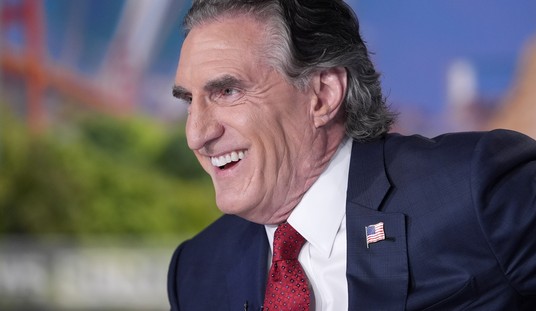Anybody else see the myriad of problems with this idea, even if one imagined that this would prevent transmission at all? The NFL desperately wants to return to the field this season, apparently even more than Major League Baseball, where players are balking at pro-rating salaries for a half-season of play. Unlike baseball, however, players interact in close proximity, usually with most or all 22 on-field players getting into full body contact on every play. How does the league stop transmission of COVID-19 in that kind of game without a vaccine?
According to ESPN and NBC’s Today show, the league wants to use N-95 mask material to fit over helmets as a means of safe play. That doesn’t involve making players look like Q-Tips on the gridiron, but rather incorporating that material into the face masks.
One problem, though — just how will that stop players from breathing on one another?
In an effort to protect players from the coronavirus, the NFL is testing new protective face mask prototypes.
The medical director for the players' union says they’re testing breathable coverings for helmets made from the same material as N95 surgical masks. pic.twitter.com/v79pPhYt1R
— TODAY (@TODAYshow) May 19, 2020
NFL engineers and sports equipment company Oakley are testing prototypes of modified face masks that might contain surgical or N95 material, the NFL Players Association’s medical director said Monday.
Speaking on Monday’s The Adam Schefter Podcast, Thom Mayer said “there will probably be a recommendation” that the NFL use such masks to protect players from the coronavirus when the league returns to play.
“Back in early March, I had suggested that we should consider novel and emerging ways to handle the helmets and the face masks and the spread of the virus,” Mayer said. “And these guys, the bioengineers that we use and that the league uses — Oakley, as you may or may not know, does all the face visors for the league under contract — these guys got the bit between their teeth.”
The league’s best and brightest engineers may work on this for a long time, but it will be tough to get around two key problems. One is that face masks are separate from faces in NFL helmets, so there is no “seal” around the nose and mouth. We have been lectured ad infinitum — and correctly — that masks which don’t provide significant closure around the mouth and nose are pretty much useless to prevent inadvertent transmission. And that’s in the context of passing within six feet of another breathing human in a grocery store. How much more does that apply when the other person is one of a half-dozen on top of you in a fumble scrum?
Second problem: how do you keep an N-95 mask clean in the course of a game? How will it not get contaminated on all sides by other players who might be asymptomatic carriers? You can’t cover it up too much, or it becomes useless as a filter. It’s not just all the huddle-tackling breathing or the potential for other players to touch the facemask, although those potentials are huge on their own. Players routinely handle their own helmets by the facemask — it’s the easy handle for a cumbersome piece of equipment. How many N-95 mask inserts will each player have to consume each game, even if they turn out to be ineffective?
The alternative would be to make an N-95 mask that fits closely to the face rather than extend over it, separate from the helmet instead of part of it. That, however, creates a major problem for athletes who require lots of oxygen to perform. Surgeons wear masks for long periods of time, but they’re not expected to run a 4.3 40 several times during a coronary bypass, either. A truly effective N-95 mask would cut down on oxygen supply and create all sorts of performance problems for NFL players. The NFL routinely supplies oxygen to players on the sideline now who come off the field with oxygen deficits after big plays. If the players have to perform with N-95 masks strapped to their faces, they’ll start passing out on the field — or the game will get a lot slower. And even that doesn’t address the difficulty in keeping the masks from getting contaminated over the course of a game, especially outdoor games in poor weather.
It’s commendable that the NFL is attempting to innovate its way back on the field rather than surrendering to a COVID-19 cancellation. However, the reality is that this sport is not conducive to tamping down viral spread in a pandemic. Either the players will have to assume a lot of risk to play the game, or they will need to wait for an effective vaccine — or for the virus to finally play itself out into herd immunity. Even the Walking Q-Tip plan is too impractical for the game to go on without coming to terms with reality.








